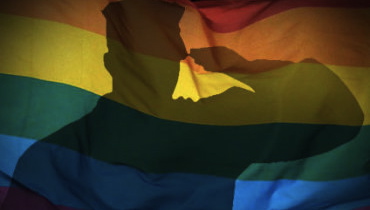 By Huong T. Nguyen
By Huong T. Nguyen
NCLR Guest Columnist
Year: 2010
The girl became my wife. Sixteen years after we first met, Alison and I live in the San Francisco Bay Area, and are proud parents of two wonderful boys. Two years ago, we were legally married in her parents’ backyard, surrounded by our closest friends and family. We had the unique joy of sharing that milestone with our children.
~~~
In 1997, the military discharged me without any characterization—meaning, neither honorable nor dishonorable. They also did not seek repayment of my scholarship because, according to them, it would have caused a public relations nightmare.
After a brief leave of absence, I went back to school with the help of financial aid put together by the school to replace my lost scholarship. Most importantly, although ROTC remained on campus, the school promised to financially assist others who found themselves in my situation so they too could complete their education.
That same year, a UCLA professor invited me to her class to speak about my military experience and gave me a poster as a token of her appreciation. The poster shows a soldier in Army dress uniform wearing a pink triangle pin like a merit badge. The words on the poster read: “Ready to Fight, Lift the Ban.” It also contains a handful of signatures of brave lesbian and gay soldiers who stood up to inequality and suffered the consequences long before the current military ban, the so-called “Don’t Ask, Don’t Tell” Policy, was promulgated by Congress in 1993.
~~~
Today, that poster hangs in my office and is a constant reminder that my work—our work—is incomplete.
We must continue to fight to repeal the ban for the thousands of lesbian, gay and bisexual soldiers currently serving our great nation. It is incredibly cruel to require them to forego fundamental life experiences—such as marrying or raising children—as a condition of service. When I enlisted in the military at 18 years old, I could not have known that the ban would affect me. That I, at age 21, would meet the person I wanted to share the rest of my life with. And that this person would be female. The arc of my life since being discharged is a testament to the profound unfairness of the ban for those currently serving.
We must also continue our work because we are not full citizens until we can serve openly. Military service is a touchstone of citizenship, one which carries tremendous significance in American culture. The 1940s racial integration of the military laid the groundwork for the 1960s Civil Rights Movement. When soldiers of different races ate, fought, and served alongside each other, they came to understand each other’s full humanity and equality of citizenship. And the seeds of that understanding were spread to every community that welcomed home those soldiers. Like my ROTC colleagues who defended my right to serve openly, soldiers who work and fight alongside openly gay colleagues will gain a new perspective on the humanity and equality of their fellow soldiers and take that perspective back to their communities.
“The world only spins forward. We will be citizens. The time has come.” – Tony Kushner, Angels in America, 1993.
Acknowledgements:
I would be remiss if I didn’t acknowledge the many people and organizations that supported me throughout my ordeal. It takes a large village to educate a student.
In particular, I salute the Servicemembers Legal Defense Network (SLDN) for fielding my call 15 years ago and advising me throughout the coming out process. Since then, SLDN has helped thousands of service members who are lesbian, gay, or bisexual, or who are perceived to be so, navigate “Don’t Ask, Don’t Tell.”
I am also grateful to David Mixner, for going to bat on this issue (despite subsequent passage of the Solomon Amendments) and helping me manage the media and preserve my dignity in a difficult time. He has also worked tirelessly on a number of other LGBTQ issues throughout his illustrious career.
I thank Rae Lee Saporin and Chancellor Charles Young of UCLA for helping me obtain financial aid to complete college, and for their promise to help others like me in the future.
And, of course, I thank the girl, my wife, the love of my life.
`
NCLR Guest Columnist Huong T. Nguyen has shared her military dismissal under “Don’t Ask, Don’t Tell” through her weekly diary blog series. Read Part One: Where There’s a Will, There’s a Way, Part Two: Light Bulb, Part Three: A New Identity, Part Four: The Education of Private Nguyen, Part Five: The Girl, Part Six: No Air, Part Seven: The Truth Will Set You Free, Part Eight: The Trial, Part Nine: The Story, Part 10: There’s A Place For Us, Part 11: The Repeal: No One Left Behind,and Finale: Don’t Ask, Don’t Tell”: In the Olden Days.
`
Nguyen is an attorney in the San Francisco Bay Area, where she resides with her wife and two children.

 By Huong T. Nguyen
By Huong T. Nguyen







